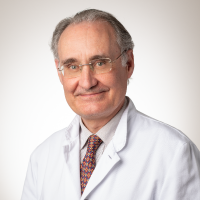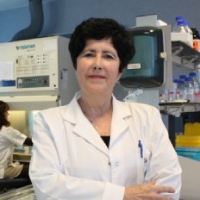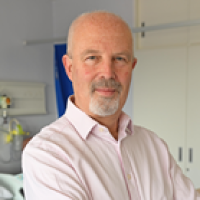Postgraduate Course organisers

Prof. Jean-François Dufour
Jean-Francois Dufour studied mathematics at the University of Geneva, Switzerland, and received his medical degree from the Geneva Medical School.
Click to read more
After training in internal medicine in Switzerland, he joined the laboratory of Professor I. Arias at Tufts University in Boston, Massachusetts, where he studied the effects of calcium signalling on bile canaliculus. He returned to the clinic to complete a gastroenterology fellowship with Prof. M. Kaplan at the New England Medical Center. Then, Professor Dufour established his own laboratory at the University of Bern, Switzerland, where he was clinic director for 10 years. Prof. Dufour is a member of EASL, the American Association for the Study of Liver Disease (fellow), and the American Gastroenterology Association (fellow). He is a founding member of the International Liver Cancer Association. He was twice member of governing board of EASL as Scientific Committee member and then as Educational Councillor. He was member of the United European Gastroenterology educational committee.
Prof. Dufour has wide clinical experience and a broad understanding of basic and translational research, its bottleneck, and the challenges in disseminating and exploiting knowledge. He has served as principal investigator on numerous clinical studies, focusing on NASH and hepatocellular carcinoma. He is an associate editor of GUT, and was an associate editor of Hepatology (responsible for the monthly “Highlights” section), Journal of Hepatology and Liver International.

Prof. Maria Isabel Lucena
Maria Isabel Lucena is Professor of Pharmacology at the University of Malaga and Director of the Clinical Pharmacology Service at the University Hospital of Malaga.
Click to read more
- Since 2013, she has been Scientific coordinator of SCReN, Platform of Clinical research and clinical trials at IBIMA.
- Former Scientific Director of IBIMA (Malaga Health Research Institute) (2013-2017).
- She belongs to CIBERehd group on DILI granted by the Spanish Ministry of Health and to the European Network of Centres for Pharmacoepidemiology and Pharmacovigilance (ENCePP). Expert of the AEMPS and the European Medicines Agency for the evaluation of liver safety of drugs.
- Member of the Executive Committee of the International Union of Basic and Clinical Pharmacology.
- Rapporteur of CIOMS working Group on Drug-Induced Liver Injury (DILI).
- Member of the expert panel of the EASL of the Liver Clinical Practice Guidelines on Occupational Liver Diseases.
- Funder and coordinator of the Spanish DILI Registry (www.spanishdili.uma.es) and of the Spanish Latin-American DILI Network and the recent set-up Prospective European DILI Registry awarded by EASL.
- Scientific coordinator of the Cost Action 17112 Pro Euro DILI NET (https://proeurodilinet.eu/).
International collaborations:
partners in the IMI Safer and Faster Evidence Based Translation consortium (SAFE-T, 2008-2015), the International Serious Adverse Event Consortium (iSAEC), IMI2 TRANSBIOLINE project (2019-), Eurostars Programme: Novel Combo Assay for Early Detection of DILI (E!114589-LiverAce. 2021-). The main lines of research in DILI are pharmacoepidemiology, identification of risk factors and patient stratification, genetic, OMIC and immunophenotyping studies in order to improve the mechanistic understanding of DILI and the qualification of novel biomarkers and their transfer into clinical practice. She has an H-index of 44.

Prof. Mark Thursz
Mark Thursz is Professor of Hepatology in the Division of Digestive Diseases and Head of the Department of Metabolism, Digestion and Reproduction in the Faculty of Medicine at Imperial College London.
Click to read more
Prof Thursz is a clinical hepatologist with inpatient beds and a clinic at St Mary’s Hospital. He was educated at King’s College London and trained in Gastroenterology and Hepatology at St Mary’s being appointed as Senior Lecturer and Honorary Consultant in 1997.
His early research work with Howard Thomas and Adrian Hill focussed on genetic susceptibility in viral hepatitis. As an extension of this theme his research expanded to encompass the natural history of viral hepatitis and factors which determine disease progression including the role of the coagulation system in hepatic fibrogenesis. In 2011, Prof. Thursz launched the Prevention of Liver Fibrosis and Cancer in Africa (PROLIFCA) programme to address barriers to control and elimination of viral hepatitis in resource limited countries. PROLIFICA has demonstrated the feasibility and cost-effectiveness of community based screening for viral hepatitis in sub-Saharan Africa and the research results have informed WHO policy.
Prof. Thursz runs a translation research programme in alcohol-related liver disease. He ran the Steroids or Pentoxifylline for Alcoholic Hepatitis (STOPAH) trial, which explored the utility of existing treatments for alcoholic hepatitis and is now involved in a portfolio of trials in alcohol-related liver disease. Recently granted an MRC Stratified Medicine award, he is now exploring novel biomarkers for diagnosis, prognosis, and risk of infection in this condition.
Prof. Thursz was Secretary-General of EASL, 2011-13. He is currently Director of the Imperial College Biomedical Research Centre and Trust Research Director for Imperial College Healthcare NHS Trust.
Welcome message
On behalf of the European Association for the Study of the Liver (EASL), we are delighted to welcome you to ILC 2021 and especially to this Postgraduate Course (PGC) on “Lifestyle and the liver”. Owing to the COVID-19 crisis, we’ve set this course up as a fully digital and highly interactive experience, drawing on experts on the field, to make it as enriching and educational as possible.
The liver is an organ particularly sensitive to lifestyles. The surge in non-alcoholic fatty liver disease (NAFLD) in the last decades is a paramount example of this sensitivity. This PGC will cover how unhealthy lifestyles affect the liver and how behavioural intervention, such as regular physical activity and nutritional changes, can improve liver diseases. This topic is very timely, given the effects of pandemic-related confinement and quarantine on people’s lifestyles.
We will provide updates on NAFLD as well as on alcohol-related liver disease (ALD). Misuse of over-the-counter analgesics, and herbal and dietary supplement products, including illicit hormonal compounds, is an emerging cause of liver disease worldwide and thus a growing concern. This course will also address the potential harm of unsupervised use of drugs and other non-prescribed agents.
The PGC is divided into six sessions, including a closing panel discussion on a multidisciplinary, outpatient approach to NAFLD and ALD. It concludes with a State-of-the-Art lecture on lifestyle and public health. In each session, a case will be presented. As members of the audience, you will then be able to reply to questions from the chairs and live voting will be available. Take part and share your experience on Twitter, using the hashtags of #ILC2021, #LiverTwitter, and #NAFLD.
The organisers and the faculty wish you an enjoyable time at ILC 2021, and we hope you find the course stimulating and informative. We look forward to seeing you again in person at ILC 2022 taking place in London, UK.
Jean-François Dufour, Switzerland
Maria Isabel Lucena, Spain
Mark Thursz, United Kingdom
Lifestyle and the liver
The liver is an organ particularly sensitive to lifestyles. The surge in non-alcoholic fatty liver disease in the last decades is a paramount example of this sensitivity. The Postgraduate Course of International Liver Congress™ 2021 will cover how unhealthy lifestyles affect the liver and how behavioural intervention such as regular physical activity and nutritional changes can mitigate liver diseases. We will provide updates on non-alcoholic fatty liver disease, as well as on alcohol-related liver disease. Because the misuse of over-the-counter analgesics and herbal and dietary supplement products, including illicit hormonal compounds, is an emerging cause of liver disease worldwide, it is a growing source of concern.
This Postgraduate Course will address the potential harm of unsupervised use of drugs and other non-prescribed agents. We hope you will enjoy this course and that you will find it informative and useful for your hepatology practice.
Learning objectives
- recognise the importance of lifestyle in the development of major liver diseases and liver-related mortality
- understand the importance of dietary regulation in the management of non-alcoholic fatty liver disease
- balance the impact of lifestyle management, drug therapy, and bariatric approaches to the treatment of non-alcoholic fatty liver disease
- promote the practice of physical exercise in patients with liver disease
- understand how to manage alcohol-related liver diseases and alcohol use disorder
- recognise the hepatotoxicity risks associated with non-conventional medicines and over-the-counter remedies
Session 1 – Non-alcoholic fatty liver disease
Liver specialists are frequently asked to treat patients with non-alcoholic steatohepatitis. In this session, we will review the latest evidence regarding different therapeutic approaches to this condition. Improving lifestyle is a cornerstone of the management of these patients. A very active drug development programme for NASH will be presented, as will alternative treatments, such as endoscopic strategies and bariatric surgery.
Session 2 – Impact of physical activity and diet on liver disease
Physical activity is known to have multiple health benefits, of relevance to patients with cirrhosis and those on the waiting list for transplantation. It is never too late to discuss exercise with patients. In this session, we will review how problematic the culture of “screen and sodas” is for the liver. Additionally, we will present sleep habits, which should not be underestimated when managing patients with liver diseases.
Session 3 – Nutritional and behavioural patterns affecting the liver
Patients and their families want to know what they should eat and whether a single beer or a glass of wine should be banished. This session will review the complexity of diets and the role of the microbiome. We will discuss a lower threshold of alcohol intake, and the evidence of smoking and liver diseases, as well as the protective hepatic effects of coffee.
Session 4 – Alcohol-related liver disease
In this session, we will present a typical case of alcoholic hepatitis, using it to illustrate some of the challenges and pitfalls in its management. After reviewing some of the latest thinking on the pathogenesis of alcoholic hepatitis, we will focus on lifestyle modifications to improve outcomes for our patients. This will include a review of the management of alcohol use disorder, which increasingly falls to the hepatology team. In addition, we have included a talk on the diagnostic performance, clinical, and forensic utility of alcohol biomarkers increasingly used in our practice.
Session 5 – Drugs and xenobiotic misuse and liver toxicity
Misuse of over-the-counter analgesics, herbal, and dietary supplement products, including illicit hormonal compounds for body-building purposes and improving sport performance, is a growing concern and an emerging cause of liver disease worldwide. This session will address the potential harm on the liver of lifestyles that encompasses the unsupervised use of drugs and other non-prescribed agents. We will explore the frequency and magnitude of liver damage induced by painkillers when taken in overdose, the diagnostic challenge, as well as the regulatory implications of liver injury associated with herbal preparations, whether used to enhance well-being or for claimed therapeutic benefit. An update of the hepatotoxicity risk related to the recreational use of cathinone derivatives, a cultural and social behaviour common in certain ethnic groups, will follow. Finally, in a dedicated presentation, we will summarise the serious consequences of the illicit traffic and consumption of hormonal products, in particular anabolic androgenic steroids, on the liver.
Session 6 – Multidisciplinary outpatient approach to NAFLD and ALD
This session will discuss the organisation and coordination of patient care, focussing on patients with NAFLD and ALD. In particular, we will explore the benefits and pitfalls of running multidisciplinary clinics engaging addiction specialists, physical therapists, dieticians, and diabetologists, alongside hepatologists or gastroenterologists. Speakers will share their experiences on how they organise their clinics and interact with other disciplines, and will discuss the benefits of incorporating other clinical specialists in patient management.
The session has been designed to leave plenty of time for debate between the audience and the panel.
Would you like to attend the Postgraduate Course? Once you have registered for ILC 2021, you can take part.

